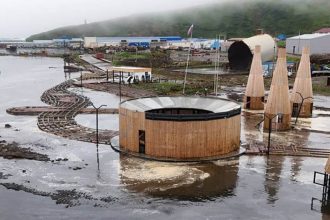President Mamnoon Hussain approved/promulgated an ordinance which amends the Pakistan Army Act 2015 to provide security to the recently set up military courts, their presiding officers and military prosecutors and also lawyers and witnesses appearing before them.
The amendment envisages in-camera trial of terrorists and a provision for proceedings through video link.
It will apply to areas where military courts have been set up or will be set up.
An announcement from the presidency said: “On a summary initiated by the Ministry of Defence, the president has approved the prime minister’s advice and signed/promulgated the Pakistan Army Act (Amendment) Ordinance, 2015.”
The Prime Minister’s Special Assistant Barrister Zafarullah, who deals with legal matters, told the media that the summary was moved by the defence ministry and endorsed by legal aides of Prime Minister Nawaz Sharif.
He said the amendment was aimed at ensuring security of the presiding officers (judges), lawyers, military prosecutors and witnesses who always remained under threat and were vulnerable to deadly attacks by terrorists for trying their accomplices.
Zafarullah said the government had also tried to protect judges, lawyers and witnesses by putting some relevant clauses in the already enacted Protection of Pakistan Ordinance-2014 (PPO).
Under the amendment to the Army Act, he said, security of judges, lawyers and witnesses would be ensured and cases would be heard through video link or in camera and would not be public.
“It is not a unique phenomenon — trials of terrorism related cases are commonly conducted through video link in many parts of the world,” he said.
Barrister Zafarullah said Article 164 of Qanoon-i-Shahadat Order-1984 has a provision to conduct hearing of sensitive cases through video link. “We are in the process of enacting specific laws for protection of judges, lawyers and witnesses,” he said.
Citing some examples of protection laws in European countries, he said that in many of them witnesses were changed and judges were allowed to wear masks to conceal their identity while hearing cases of terrorism.
He said the basic reason behind setting up military courts and sending all terrorism related cases to them was that the civil courts faced immense pressure and threats while trying these cases. As a result, such cases were delayed.
So far nine military courts have been set up, three each in Punjab and Khyber Pakhtunkhwa, two in Sindh and one in Balochistan.
The president has also approved proposals and summaries for setting up military courts in the Federally Administered Tribal Areas (FATA) as well as Azad Kashmir.





